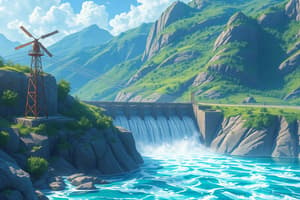Podcast
Questions and Answers
समुद्री संवेग ऊर्जा तुलना में डैम परिस्थितियों की तुलना में क्या सबसे अधिक विशेष है?
समुद्री संवेग ऊर्जा तुलना में डैम परिस्थितियों की तुलना में क्या सबसे अधिक विशेष है?
- कम स्थान (correct)
- नवाचार
- लागत
- पर्यावरण के मित्र
S.S.T. किस प्रकार के प्रदूषण में योगदान नहीं करता है?
S.S.T. किस प्रकार के प्रदूषण में योगदान नहीं करता है?
- समुद्री प्रदूषण (correct)
- पानी प्रदूषण
- भू-प्रदूषण
- वायु प्रदूषण
S.S.T. प्रौद्योगिकी में किस समस्या से सामना करना पड़ता है?
S.S.T. प्रौद्योगिकी में किस समस्या से सामना करना पड़ता है?
- प्रेरक समानता
- संरेखिकरण
- तरलता प्रबंधन (correct)
- मानकीकरण
समुद्री संतुलन तंतु किस प्रकार के पर्यावरण के लिए सुरक्षा पहुंचाता है?
समुद्री संतुलन तंतु किस प्रकार के पर्यावरण के लिए सुरक्षा पहुंचाता है?
समुंदरी संतुलन परियोजना में लागत किसलिए हो सकती है?
समुंदरी संतुलन परियोजना में लागत किसलिए हो सकती है?
समुंदर संतुलन तंतु किसे पर्यावरण के मित्र बनाता है?
समुंदर संतुलन तंतु किसे पर्यावरण के मित्र बनाता है?
S.S.T (Submerged Submarine Turbines) का उपयोग किसके लिए किया जाता है?
S.S.T (Submerged Submarine Turbines) का उपयोग किसके लिए किया जाता है?
पहले हाइड्रोइलेक्ट्रिक पावर विकास के प्रारंभिक दिनों में क्या प्रचलित था?
पहले हाइड्रोइलेक्ट्रिक पावर विकास के प्रारंभिक दिनों में क्या प्रचलित था?
मॉडर्न युग में, समुन्दरी सिस्टम्स की परिचय कौन-सा है?
मॉडर्न युग में, समुन्दरी सिस्टम्स की परिचय कौन-सा है?
'Foynstunnel' कहाँ स्थित है?
'Foynstunnel' कहाँ स्थित है?
'S.S.T. Technology' के साथ कुछ सुविधाएं हैं?
'S.S.T. Technology' के साथ कुछ सुविधाएं हैं?
'Hydraulic Engineering' में क्या नवाचार हुआ?
'Hydraulic Engineering' में क्या नवाचार हुआ?
Flashcards are hidden until you start studying
Study Notes
S.S.T.: A Brief History
The term 'S.S.T' (Submerged Submarine Turbines) refers to a type of hydroelectric power generation system designed to produce electricity from tidal flows by utilizing the motion of water flowing through tunnels built underwater. This technology has been developed over several decades with the aim of generating large amounts of renewable energy without having significant environmental impacts or interfering with other marine activities.
Early Developments
The idea of using turbines submersed beneath the surface to generate electrical power is not new. In the early days of hydroelectric power development, it was common practice to place traditional water wheels beneath dams to convert kinetic energy into mechanical rotational force. However, constructing such systems required land-based dams, which could have negative ecological consequences.
Modern Era: Introduction of Undersea Systems
Innovations in hydraulic engineering led to the creation of underwater tunnels that use crossflow venturi effects instead of impoundment. These structures allow for the capture of energy directly from moving waters, reducing the need for massive land-based reservoirs and minimizing potential disruption to ecosystems. One example of this approach is the Foynstunnel, a structure constructed near Haugesund in Norway.
Advantages of S.S.T. Technology
There are several advantages associated with S.S.T. technology compared to more conventional methods like dammed river power stations:
-
Space: Since they do not require damming up large volumes of water, these turbines can be installed in locations where there is less space available for construction, making them suitable even in densely populated areas.
-
Environmentally Friendly: Because S.S.T.'s do not involve changing the course or level of rivers, their impact on wildlife habitats is minimal. Moreover, since they operate underwater, their visual impact is also reduced.
-
Renewability: Like all forms of hydroelectricity, the resources used to create electricity via S.S.T. are natural and replenish automatically without any human intervention. As opposed to fossil fuels, it does not contribute to global warming or pollution.
However, some challenges remain when implementing this kind of project:
-
Cost: Constructing S.S.T. facilities requires substantial investment due to complex design requirements, specialized materials, and advanced manufacturing techniques.
-
Technical Issues: Maintaining equipment at great depths presents unique problems. For instance, frequent challenges may arise related to corrosion management, pressure equalization, and biocorrosion prevention.
While still relatively uncommon today, S.S.T. technology represents a promising direction towards cleaner, sustainable sources of energy. Its increasing popularity echoes larger trends within the green energy sector aimed at mitigating climate change while preserving nature's beauty — something likely to gain further traction in coming years.
Studying That Suits You
Use AI to generate personalized quizzes and flashcards to suit your learning preferences.





